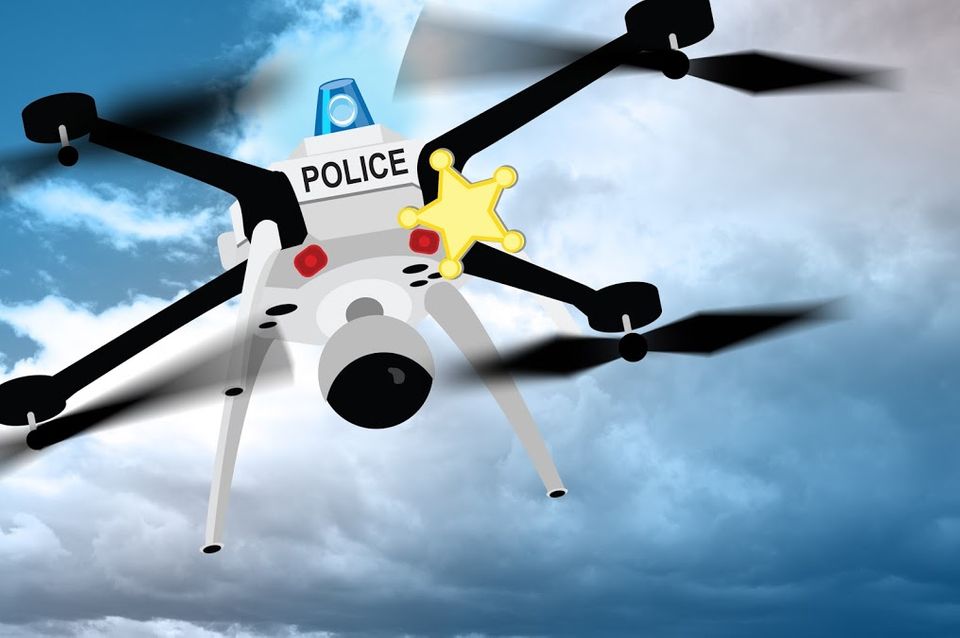For police drone use, ‘the floodgates are about to open’

Imagine a future in which small drones blanket a city to watch for criminal activity. Without new restrictions on drone use in place, some privacy activists say, that scenario isn’t far-fetched.
The use of drones and other technologies has marked a shift from “labor-intensive and expensive” 20th-century policing, said Adam Schwartz, senior staff attorney at the Electronic Frontier Foundation, toward cheaper and easier surveillance methods. By mounting powerful cameras, cell phone trackers, and facial-recognition and infrared technologies on drones, he added, police could “conveniently, easily, and cheaply spy on anyone.”
U.S. law enforcement agencies’ primary uses of drones, according to Jay Stanley, a senior policy analyst at the American Civil Liberties Union, seem to be searching for missing people and photographing crime scenes. However, he said, “we know that the floodgates are about to open…Police departments will start to figure out the technology and how they can use it, and at least some of them will start to push the boundaries.”
Drone use in the United States, by both government agencies and private owners, seems to be “greatly proliferating,” said Adam Schwartz, a senior staff attorney at the Electronic Frontier Foundation. “When it comes to police use of drones, we have a great deal of anxiety.”
With the Federal Aviation Administration looking into regulations that would establish safe-flying rules and require drone owners to register their machines with the agency, some law enforcement organizations have been reluctant to purchase drones this year, Stanley said. But new ground rules might give them confidence to move forward with their plans.
So far, there is precious little public information about how many law enforcement agencies are using drones and what they are using them to do. And there are precious few rules limiting how police can use drones.
“We don’t want police putting a drone in the sky and looking down on the general public in a dragnet fashion for misconduct they might come across.” — Adam Schwartz, senior staff attorney, Electronic Frontier Foundation
The FAA, in response to a Freedom of Information Act lawsuit brought by the EFF, released in 2012 a list of 60 agencies that had applied for U.S. drone permits, including police departments in Colorado, Washington, Florida, and Texas. It also identified agencies that had active FAA drone certificates that year: 13 local law police forces, all four major U.S. military branches, the FBI, and the Department of Homeland Security’s Customs and Border Protection.
Six states, including Illinois and Florida, passed laws in 2013 requiring police to get court-approved warrants to conduct drone surveillance and report their drone use in most circumstances, and more than a dozen states have passed laws limiting drone use either by police or by private owners. But most state and federal lawmakers haven’t followed suit.
During protests in Baltimore related to the death of Freddie Gray early this year, the FBI authorized 10 surveillance flights over the city.
“We don’t want police putting a drone in the sky and looking down on the general public in a dragnet fashion for misconduct they might come across,” Schwartz said, adding that restrictions on drone use could prevent abuse of the technology.
Other legal experts are less concerned about the privacy implications of drones, whose cheaper methods of surveillance are limited.
Police drones are often “small remote-controlled helicopters or airplanes, capable of a flight time of less than one hour,” Gregory McNeal, a professor in the Pepperdine University School of Law, wrote in a November 2014 paper for the Brookings Institution. “The surveillance equipment that can be placed on these drones is also far less intrusive than that which can be mounted to manned aircraft.”
Requiring warrants for police to operate drones would limit legitimate uses, such as ensuring public safety at large sporting events, McNeal said. Warrant requirements, he added, “will result in the grounding of drone technology in circumstances where law enforcement use of drones would be beneficial and largely noncontroversial.”
Privacy advocates are pushing for legislation limiting drones “not because the technology represents an actual threat to civil liberties,” he said, “but because someday in the future, the technology may be intrusive.”
